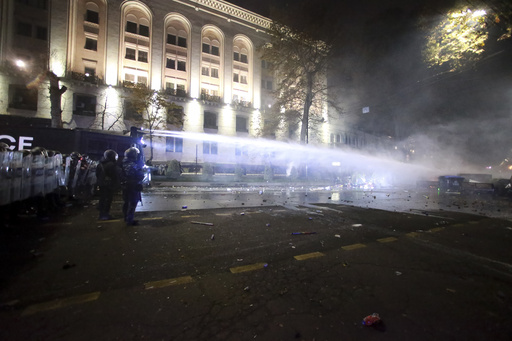
TBILISI, Georgia — In a significant escalation of unrest, over 100 protesters were detained overnight in Georgia amid violent confrontations with law enforcement. These protests erupted in response to the government’s recent announcement that it would halt negotiations for membership in the European Union, as reported by the Interior Ministry on Saturday.
This marked the second consecutive night of protests triggered by Prime Minister Irakli Kobakhidze’s revelation that the government had suspended talks regarding EU membership. Demonstrations occurred in several major cities on Friday night, including the capital city Tbilisi and the coastal city of Batumi.
Eyewitness accounts revealed chaotic scenes in Tbilisi, with police reportedly chasing and assaulting demonstrators outside the parliament building. Riot units employed water cannons to disperse crowds and forcefully pushed protesters further along Rustaveli Avenue, the city’s primary thoroughfare.
The police response extended to media personnel as well, with reports suggesting that officers used aggressive tactics to silence journalists and directed insults toward the protestors through loudspeakers.
Widespread discontent stemmed from Georgian Dream’s contested victory in the parliamentary elections held on October 26, seen by many as a referendum on the country’s EU ambitions. The opposition has alleged that the elections were manipulated, with claims of Russian interference aimed at keeping Georgia within its sphere of influence.
President Salome Zourabichvili showed solidarity with protestors, joining them on Thursday and accusing the government of waging a conflict against its own citizens. In her address to the nation, she urged restraint from police, saying, “It has become clear that no one is prepared to accept a Georgia under Russian influence, stripped of its constitution, or governed by an illegitimate regime.”
Zourabichvili also acknowledged the unprecedented nature of the protests, stating, “I recognize you all on Rustaveli Avenue and in cities such as Batumi, Kutaisi, Zugdidi, and Akhmeta. It is rare for Georgians to unite in such an immediate and widespread manner.”
The government’s announcement to suspend EU discussions came shortly after the European Parliament condemned the recent parliamentary elections, labeling them as neither fair nor free. The resolution criticized the ruling Georgian Dream party for perpetuating democratic decline in the country.
Observers from the EU noted that the elections were marred by a tense environment filled with allegations of bribery, double voting, and physical aggression. Although Georgia was granted candidate status by the EU in December 2023 under specific criteria, its integration has been stalled due to earlier legislative actions perceived to undermine democratic integrity, particularly the controversial “foreign influence” law.
EU officials have called for a re-election within a year, overseen by international monitors and handled by an independent electoral authority. They have also suggested imposing sanctions and distancing formal relations with the Georgian government.
In reaction, Prime Minister Kobakhidze responded sharply to EU criticisms, dismissing them as a barrage of insults and labeling the European Parliament’s actions as an unacceptable form of coercion against Georgia. He stated, “The detractors of our nation have transformed the European Parliament into a tool of blackmail, which is shameful for the EU.”
Additionally, Kobakhidze indicated that Georgia would not accept any EU financial aid until the conclusion of 2028. Critics of the ruling Georgian Dream party, established by billionaire Bidzina Ivanishvili, assert that the government has shifted toward authoritarianism, adopting measures reminiscent of Kremlin strategies that restrict free speech and limit LGBTQ+ rights.
